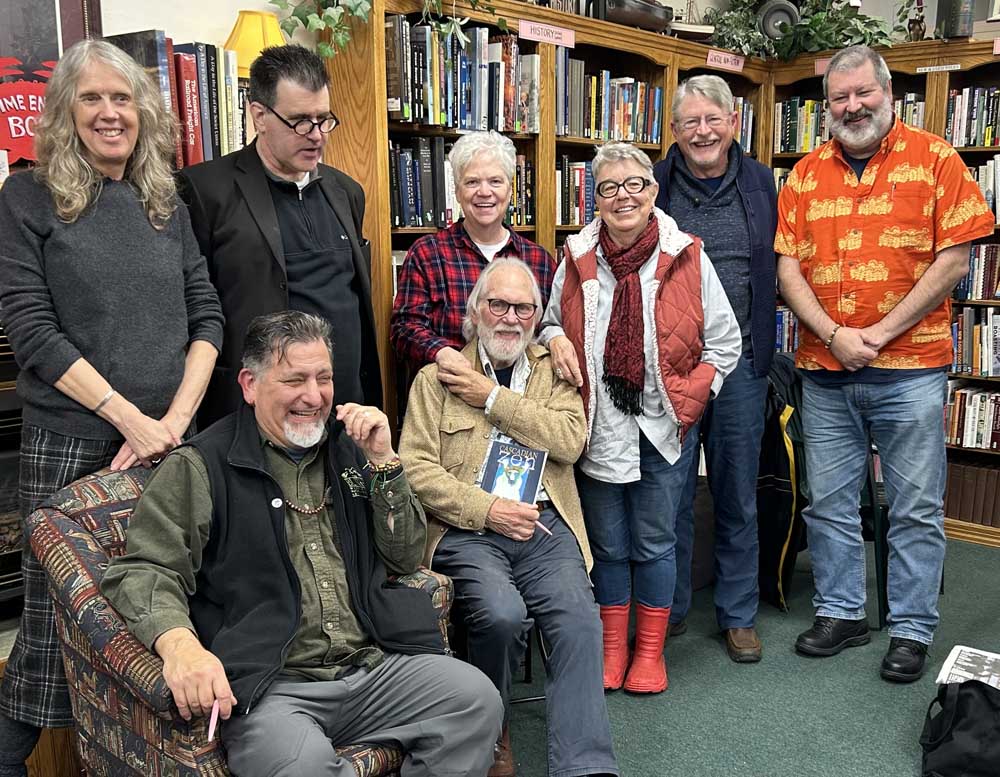Coast Chronicles: Humanities and a roving band of poets
Published 8:29 am Monday, December 11, 2023

- The band of poets and book purveyors (from the left): Adelia MacWilliams, Bill Ham, Karla Nelson, Cate Gable, Jim Dott, Jason Wirth; seated (left) Paul Nelson and Robert Pyle.
Amanita mushrooms seem to love these atmospheric rivers. Their bulbous red heads are popping up through the pine needles and twigs all along the Pacific Pines footpaths. Some are smooth and ruby red, others dark orange with ragged white skirts around their stems; some are spotted. The older ones lose their smoothed edges and flatten into fringe; or are knocked over and lie wet and mangled, their creamy gills showing. Many are nibbled by forest creatures.
Trending
One friend from the East Coast sent me a ceramic version for my garden; she was so proud of it without realizing these ‘shrooms are poisonous. (Amanita muscaria contain psychoactive alkaloids: muscarine, ibotenic acid and muscimol.) They can cause hallucinations, coma, and death; but they have a practical use too: they help trees transfer nutrients into their roots. Sometimes called fly agaric, in folkloric tradition some think of them as the homes of fairies and magical creatures.
Wait a minute … here I am talking about mushrooms when I wanted to talk about a band of roving poets. But then I spontaneously Google “amanitas poetry” — I can’t help myself — and I find one of my all time faves, Emily D, who has this wonderful offering:
The Mushroom is the Elf of Plants –
Trending
At Evening, it is not
At Morning, in a Truffled Hut
It stop upon a Spot
As if it tarried always
And yet it’s whole Career
Is shorter than a Snake’s Delay –
And fleeter than a Tare. . .
Had Nature any supple Face
Or could she one contemn –
Had Nature an Apostate –
That Mushroom — it is Him!
[Note that the “tare” button on a scale is what you press when you want the scale to disregard, or zero out, the weight of the box or container from the contents — like at a salad bar.]
Dying languages
So I’m suddenly back on topic and rather pointedly illustrating my theme here: poets, the humanities, the “inner arts” as Paul Nelson calls them (more on him in a moment) tie words to science, tie our hearts and minds to our place, unite the intellect into one cohesive force. And can even be humorous.
And yet, many institutions of higher learning are dispensing with the study of
humanities in exchange for beefing up classes they think will help students get jobs. This to me is a prime example of cutting off your nose to spite your face. Humanities is the study of the history and development of human thought and culture: it includes literature, history, philosophy, religious studies, foreign languages, art and film.
For awhile in the Bay Area all my buds were English majors yet we were working in a variety of fields from high tech, to urban planning, to banking. Why? Because studying one of the aforementioned fields teaches you how to think, write, and communicate clearly.
On the other hand, suppose you were a student of coding languages not so many years ago, thinking that surely learning about the workings of technology would be the road to riches? Guess what? Now over 55 percent of coding is being done by AI-bots and soon that number will be higher. COBOL, C, C++, RUBY, Pascal, ALGOL, APL, Basic, PL/1, SIMULA 67, CLU are all computer coding languages which have died, passed over for more efficient or more useful versions. Whereas, our amazing English language — the foundation of the humanities — is still the most robust on the globe; it reigns supreme.
OK, I’ll admit I gave up teaching English at one point: my initial full-time teaching salary in 1974 with an MA was $4,500, half the national average wage, and I was also a 24/7 dorm mom. I entered the banking world for two decades and was hired not in spite of but because of my humanities degrees; I could write and think. (Initially, I worked on main frame computers writing reports about the M1 money supply.) Not once did I rue the day I piled up a bunch of degrees in English. I think my studies also nurtured in me the kind of curiosity that is essential to being a healthy adult. Wondering about things makes life fun; it means you are always asking questions like “Why?” “How much?” “Where?” and “Who says so?!”
Band of poets
So, last week I had the great pleasure of traveling around with a band of poets and thinkers, reading stuff we’d written about the world and how we see it. It felt like medieval times when wagons of various craft guilds went from town to town selling their wares. We were selling the concept of where we live — also known as Cascadia — what’s going on here and how to take care of it.
Our band consisted of Paul Nelson, founder and director of the Cascadia Poetics Lab (cascadiapoeticslab.org); Jason Wirth, (chair and professor of philosophy, Seattle University, Watershed Press board); Adelia MacWilliam (interim managing editor, Watershed Press); Dan Clarkson (Watershed Press board); and illustrious poets Tess Gallagher; Alice Derry; Gary Lilley; Tim McNulty; and our own locals, me (Watershed Press, board); Robert “Bob” Pyle (lepidopterist, writer, teacher, and founder of the Xerces Society www.xerces.org); Jim Dott, Florence Sage and John Ciminello. We mixed and matched and read at three different venues from Port Angeles to Astoria.
We talked about place. We all love where we live, in the northern most locations in the Cascadia eco-region. And we wrote and spoke about rain, orcas, music, rivers, aunties and tea, family stories, mountains, worms, elk, children, and everything in between. In short, we talked about being human on a planet in need of attention.
As Paul wrote me, “The inner arts are decreasing in this culture while partisanship, violence and division is rampant. There is a connection, and it is in our best interests to investigate. Arts are the way this has been done for centuries. Still think the market or technology will save us?” Some folks do. (He always ends his email with “Typed w/ thumbs. Ugh.” In many ways it’s those opposable thumbs that have gotten us into so much trouble.)
Jason, added to the conversation, “At a time of grave political and ecological challenges, the humanities are under siege. Without them, we cannot give voice and song to what we are losing and to the responsibilities that we are failing to address. But people find a way to carry the torch anyway!”
Carrying the torch
We did. We carried the torch. We gave voice to the land, to our fellow creatures, and to the wonders of being alive. And the many people who came to see us and hear us were there to carry the torch as well. The whole adventure was thrilling. It was a manifestation of collaboration — and we were supported by technology: we were videoed at Peninsula College (thank you Tim Brye and Kate Reaves!); we were recorded on Carol Newman’s KMUN radio show Arts Live and Local (archive audio here: 12/8/23 kmun.org/archives); we used our cameras to record who showed up; and our printing presses to spread the word.
Many aspects of human achievement came together — but the spark was lit by the humanities, the study of us. Do not think that cutting these essential programs from any institution is saving anyone time or money. If anything will save our world from the dangers, dysfunction and disfiguration we see all around us, it will come from those who have studied the humanities. I guarantee it.
Writer, historian and one-time book vendor, Sydney Stevens, was there at our Time Enough Books reading in Ilwaco, and I loved what she wrote me after the event, “I’d love to be a poet when I grow up. You all made me think and laugh and, of course, feel weepy inside. How many ways can you mean a word, express a thought, tease out emotions that were never apparent or intrinsic. What is it about poets that makes me fall a little bit in love with each of you?” Might we say the study of humanities?









